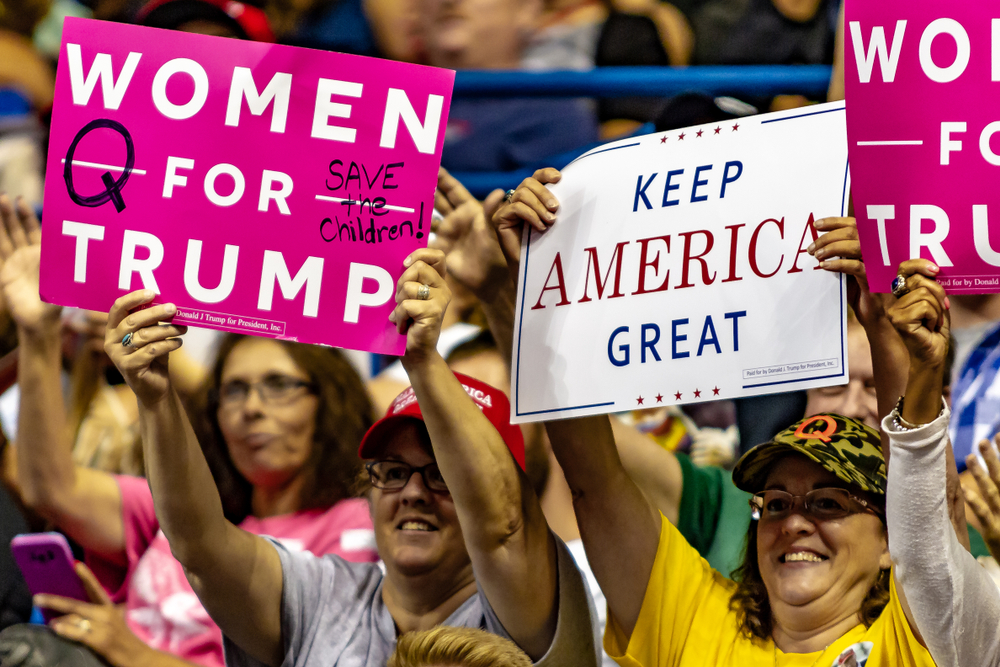The most recent national elections in the United Kingdom and United States yielded record numbers of women legislators. Yet in both countries, those numbers were driven by the election of women on the Left. While women are now a majority of Labour MPs, fewer than a quarter of Conservative MPs are women. In the US Congress, women make up 37.7% of the Democratic Party and a mere 8.8% of the Republican Party. (In Australia, the federal figures are 47% women in Labor and 23% women Liberal.)
The under-representation of women in right-wing parties is a global phenomenon. In our recently published article, Mary Nugent and I argue that comparing the experiences and strategies of Conservative and Republican women can help us to better understand this phenomenon. It also allows us to delve deeper into the structural and ideological differences between UK and US politics, and the gendered impact of those differences.
Right-wing women work as strategic party actors, advocating for women’s increased representation tactically within the specific electoral, ideological, and institutional contexts of their party.
We analysed how women in the Conservative and Republican parties have made the case for electing more female legislators. Our findings show that right-wing women work as strategic party actors, advocating for women’s increased representation tactically within the specific electoral, ideological, and institutional contexts of their party.
Recruiting women and framing ‘identity politics’
In response to electoral losses that highlighted the need to diversify their parties, Conservative and Republican party leaders launched female candidate recruitment initiatives. Women2Win was created by the Conservative Party in 2005 and remains active today; the comparatively short-lived Project GROW was launched by the National Republican Congressional Committee in 2013 and later dissolved in 2015. The goal of each of these initiatives was to increase the number of right-wing women in the national legislature.
 But while efforts focused on increasing women’s representation in left-wing parties have been relatively successful, right-wing parties tend to reject the idea that different social groups have distinct policy interests or perspectives. This ideological aversion to an ‘identity politics’ that promotes women and minorities has made it harder for right-wing women to win seats and advocate on behalf of their gender identity. How, then, do women in right-wing parties make the case that their political representation matters?
But while efforts focused on increasing women’s representation in left-wing parties have been relatively successful, right-wing parties tend to reject the idea that different social groups have distinct policy interests or perspectives. This ideological aversion to an ‘identity politics’ that promotes women and minorities has made it harder for right-wing women to win seats and advocate on behalf of their gender identity. How, then, do women in right-wing parties make the case that their political representation matters?
We collected all archived press releases, campaign materials, and news articles related to Women2Win and Project GROW created within the first two years of the inception of each initiative. We then read each source and extracted statements made by party elites that pertained to either the general problem of Republican women’s under-representation or the recruitment initiative itself. Interviews conducted with women MPs and MCs also gave us insight into their strategies and roles in these initiatives.
Women talked more about how increasing women’s representation was important for the electoral success of the party than they did about the important perspectives women could bring to the policymaking process
We found several similarities between Conservative and Republican women in terms of the way they framed the importance of women’s representation. For example, in both countries, women favored ‘electoral’ frames over ‘conventional identity politics’ frames. That is, they talked more about how increasing women’s representation was important for the electoral success of the party than they did about the important perspectives women could bring to the policymaking process. In the same way, they rarely discussed how initiatives like Women2Win and Project GROW could help women overcome specific gendered barriers when running for office and talked more often about how these initiatives could help the party win future elections.
How structural differences influence messaging strategies
Our findings show that right-wing women in both the UK and US work within the ideological norms of their party. However, we also found important differences that emphasize the significance of electoral systems and party structures in shaping women’s strategies. While there exist many differences between UK and US politics, I’ll focus here on the fact that national political parties in the UK play a much larger role in the candidate selection process than they do in the US.
 The Conservative Party, for example, selects candidates for the general election via votes of dues paying party members in each constituency, usually without input from the wider voting public. While technically run by local associations, the national party plays a significant role in these candidate selections by establishing rules and determining eligibility for candidacy – in the case of the Conservative Party, via an approved candidate list. By contrast, parties in the US hold primary elections in which registered voters select the party’s nominee. As a general principle, national party organizations, like the National Republican Congressional Committee, do not endorse or support candidates in primaries.
The Conservative Party, for example, selects candidates for the general election via votes of dues paying party members in each constituency, usually without input from the wider voting public. While technically run by local associations, the national party plays a significant role in these candidate selections by establishing rules and determining eligibility for candidacy – in the case of the Conservative Party, via an approved candidate list. By contrast, parties in the US hold primary elections in which registered voters select the party’s nominee. As a general principle, national party organizations, like the National Republican Congressional Committee, do not endorse or support candidates in primaries.
This difference in candidate selection processes affects how Conservative and Republican women approach and message female candidate recruitment. For instance, one priority of Women2Win was to create an ‘A-List‘ of priority candidates that was at least half women. Project GROW, on the other hand, focused more on recruiting women and reaching out to women voters.
Our research further shows that women thought seriously about who would be the best messengers to advance their goal of increasing women’s representation within these contexts. While Republican women were most often the messengers for Project GROW, Conservative women made sure to frequently include men as messengers for Women2Win.
Conservative Party elites and local party associations, which tend to be a majority male, were the main target audience for Women2Win. As such, one of the co-founders of Women2Win described the use of men as a useful source of credibility: ‘I think it just sends a good signal to the other male MPs that this isn’t just a kind of – you know, extreme feminist, politically correct claptrap as some of them might say. So we’ve always tried to involve [men]’. In a similar vein, since its inception Women2Win has been led by two co-chairs, made up of one woman and one man, as an important signifier that recruiting women into the party was a task for both men and women.
We have a message I think that reaches women, and we need to make sure that we’re actively and aggressively telling that story. And there’s no better way to do it than being a woman who talks about it
In the more candidate-centered context of US politics, the goal of encouraging more Republican women to run for office led Republican women to see themselves as the obvious messengers for Project GROW. Congresswoman Ann Wagner told The Atlantic, ‘We have a message I think that reaches women, and we need to make sure that we’re actively and aggressively telling that story. And there’s no better way to do it than being a woman who talks about it’.
Right-wing women’s representation
Since the establishment of Women2Win in 2005, the percentage of women in the parliamentary Conservative Party has increased from 9% to about 24%. But while the number of Republican women increased slightly in the election year following the implementation of Project GROW, the US has actually seen the percentage of women in the congressional Republican Party decrease from 9.8% in 2013 to 8.8% 2020. While this difference is a result of a plethora of factors, the ideological and institutional context of the UK meant women advocating for change in the Conservative Party were able to effect more significant and long-lasting changes than their counterparts in the Republican Party.
Ideology, including an aversion to gender ‘identity politics’, will likely remain a significant barrier for right-wing women’s political representation across the globe.
Ideology, including an aversion to gender ‘identity politics’, will likely remain a significant barrier for right-wing women’s political representation across the globe.
But we show how electoral systems – and the role of parties – also have implications for the way female candidate recruitment initiatives are implemented and framed. Our findings serve as a reminder that policies and programs that aim to promote women in politics need to be cognizant of the institutional constraints right-wing women must navigate – and in cases like US, might need to find ways to address those constraints.
The article first appeared in the LSE British Politics and Policy blog and is rebublished under Creative Commons. You can read the original article here.




